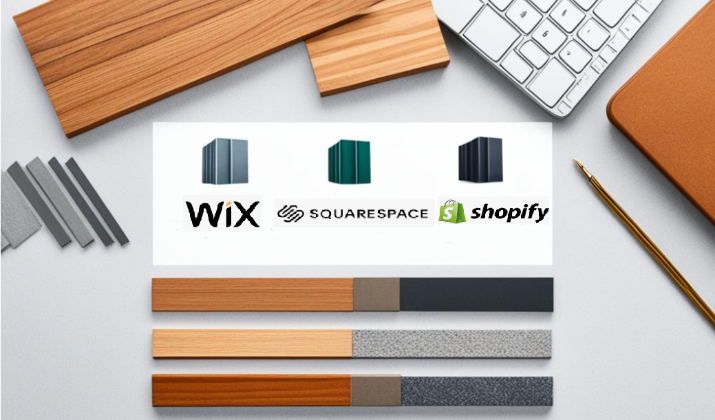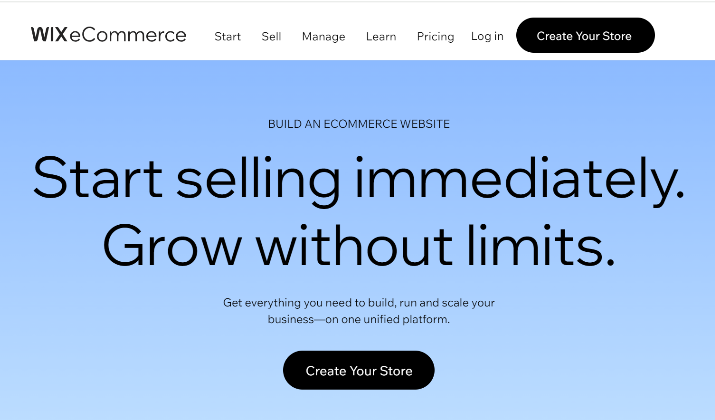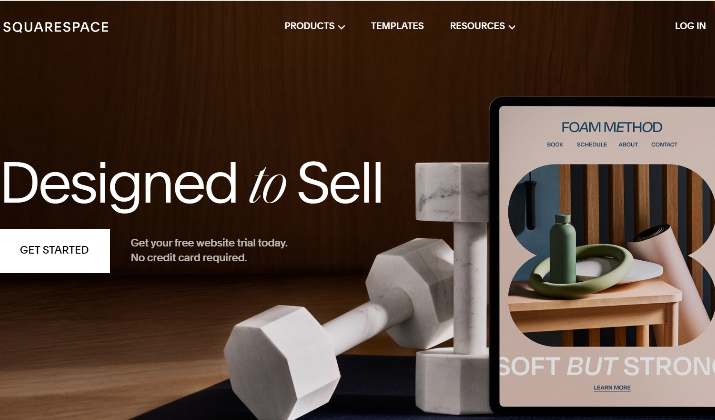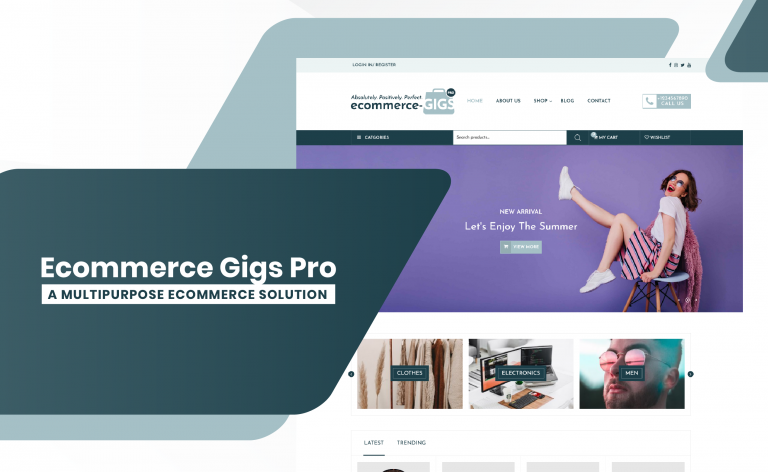Are you on the lookout for the best website builder or ecommerce platform?
Wix, Squarespace, and Shopify are prominent website builders and ecommerce platforms packed with different features and design styles. They are popular with both businesses and people wanting to create an online presence.
What makes these three stand out from the rest? And, which one is right for you?
Today, we will compare Wix, Squarespace, and Shopify in detail. This will help you make a well-informed choice based on your needs.
Let’s begin.
Introduction to Website Builders
In today’s world, it’s crucial to have a place online, whether you’re a person or a company.
Website builders help you create your own site easily. You don’t need to know a lot about coding or building websites to use them. These tools are simple to use and offer many features.
You can choose from many templates and tools designed to make your website stand out.
Wix, Squarespace, and Shopify are some popular website builders. They each have their own strengths, making it easy for anyone to make a site.
If you’re a small business owner or a creative person, they’re great options. They offer easy-to-use features and many ways to personalize your site. This helps you make a site that shows who you are and what you have to offer, attracting your audience.
Also read: Ecwid vs WooCommerce
Wix vs Squarespace vs Shopify – An Overview
Wix
Wix is a website builder that offers a comprehensive platform to create professional-looking websites without requiring coding knowledge. It is known for its ease of use, with a drag-and-drop interface that allows users to build and edit their sites visually.
This platform provides a wide range of features, including a built-in email marketing suite, social media integration, and support for over 180 languages with auto-translation of website content.
It also offers a variety of SEO tools, including meta tags, canonical tags, and XML sitemaps, to help users optimize their sites for search engines.
Wix is suitable for a broad audience, from simple portfolios to small businesses looking to build a brand online and sell products.
However, it may not be the best choice for very large online stores due to limited scalability or niche websites that require more dedicated features for their industry.
In addition to its core features, Wix offers a range of additional tools and functionality, including Wix Artificial Design Intelligence (ADI), which can create a professional website in just a few minutes without requiring content input.
The Wix AppMarket provides hundreds of apps to choose from, ranging from social media tools to contact forms and live chat, allowing users to customize their site’s functionality.
Check out: Shopify vs Wix
Squarespace
Squarespace is a versatile website builder known for its visually striking and minimalist designs. It offers a user-friendly interface with drag-and-drop features, eliminating the need for coding.
The platform provides customizable templates, pre-built layouts, and design tools to create professional websites, online stores, portfolios, blogs, and more.
Users can easily customize content layouts, duplicate pages, and access features like asset uploading, mobile-optimized designs, integrated analytics, mailing lists, SEO tools, and more.
Squarespace also supports ecommerce, allowing users to add products, configure shop and blog pages, and manage online payments.
The platform includes hosting, eliminates the need for additional plugins for SEO, and ensures clean HTML markup for search engine indexing.
Explore: Ecwid vs Squarespace
Shopify
Shopify is a comprehensive ecommerce platform designed to empower individuals to start, manage, and expand their businesses online.
It offers a range of features and tools to cater to the diverse needs of businesses, from startups to established enterprises.
The platform prioritizes flexibility, allowing users to customize their online stores with ease. It provides customizable themes, AI features, access to mobile shoppers, and a user-friendly checkout process.
Additionally, users can enhance their Shopify experience by integrating apps, utilizing add-ons, and exploring different sales channels.
The platform also provides extensive support resources, including a Help Center, Academy courses, a blog, community forums, webinars, and a dedicated support team available 24/7.
Shopify’s key features, ways to sell, pricing plans, and support options make it a versatile and user-friendly platform for anyone looking to establish an online presence for their business.
If you mainly want to sell online, Shopify can be a better fit. But if you need a mix of general website features and the ability to sell, Wix and Squarespace are solid options.
The best choice will hinge on what’s more important to you: selling online, customizing your site, or how easy it is to use.
Read this too: Shopify vs Lazada
Try Shopify free followed by first month at just $1. No credit card required. Limited Time Offer.
Ease of Use
All three platforms – Wix, Squarespace, and Shopify – are easy to use. They have user-friendly interfaces but with different levels of complexity.
Here is a comparison of the three website builders:
- Wix: Wix stands out for its drag-and-drop interface, making it easy for users to build websites quickly. The platform provides a detailed guide from the dashboard, assisting users in setting up their websites, adding products to the store, setting up payments, and more. Wix’s templates save time and cater to various business needs, making it a suitable choice for beginners.
- Squarespace: Squarespace, known for its blogging functionality, offers a fairly simple dashboard suitable for beginners and non-coders. It provides detailed guides for users starting out, making it easy to kick off an online business. Squarespace is intuitive and user-friendly, allowing users to navigate core features easily.
- Shopify: Shopify is recognized for its outstanding user-friendliness, with a simple setup process ideal for e-commerce beginners. The platform’s dashboard and tutorial videos facilitate the creation of new websites with ease. Shopify’s intuitive interface and basic management features make it a top choice for those new to ecommerce.
While all three platforms, Wix, Squarespace, and Shopify, are user-friendly and do not require technical knowledge or coding skills, they excel in different aspects.
Wix is praised for its drag-and-drop interface and detailed guides, Squarespace for its simplicity and support for beginners, and Shopify for its outstanding user-friendliness and ease of setup, particularly for ecommerce ventures.
Picking the right platform depends on what you need. Whether it’s a website, online store, or both, how easy it is to use matters a lot.
Also read: Ecwid vs Adobe Commerce
Design & Templates
When comparing the design and templates of Wix, Squarespace, and Shopify, each platform offers unique features:
- Wix: Wix stands out for its extensive range of customizable templates, making it a great choice for creative freedom and versatility. However, Wix templates are not fully responsive, requiring manual adjustments for mobile display.
- Squarespace: Squarespace is known for its sleek design templates and user-friendly interface. It provides numerous ecommerce templates catering to various industries, with a focus on aesthetics and sales. Squarespace templates are fully responsive and offer customization options for layout, design, and interactive elements.
- Shopify: Shopify offers over 70 designs, both free and premium, with a strong emphasis on ecommerce functionality. While Shopify themes are 100% responsive, they are more tailored towards online stores and may have fewer design customization options compared to Wix and Squarespace.
In summary, Wix excels in quantity and versatility, Squarespace focuses on sleek design and user-friendly features, while Shopify prioritizes ecommerce functionality and responsiveness.
The choice among these platforms depends on your specific needs, whether it’s creative freedom, aesthetic appeal, or robust ecommerce capabilities.
Check out: Shopify vs Instamojo
Try Shopify free followed by first month at just $1. No credit card required. Limited Time Offer.
Ecommerce Capabilities
When comparing the ecommerce capabilities of Wix, Squarespace, and Shopify, each platform offers unique strengths:
- Shopify: Known for its robust ecommerce features, Shopify is designed specifically for online stores of all sizes. It excels in automated SEO features, extensive app availability, and granular control over product details, making it ideal for businesses focused on online sales.
- Wix: Wix is a versatile platform with hundreds of customizable templates for storefronts, making it suitable for personal sites, portfolios, blogs, and small businesses. While it offers ecommerce capabilities, Shopify outshines Wix in terms of dedicated ecommerce functionalities and app availability.
- Squarespace: Squarespace stands out for its design-centric approach, offering beautifully designed templates and a user-friendly interface. It is favored by small creative businesses for its suite of web design tools and features that cater to portfolios, blogs, and small businesses.
Shopify is best suited for businesses focused on online sales, Wix is versatile for various website types, and Squarespace excels in design and is ideal for small creative businesses.
Explore: Shopify vs Shopware
Pricing Comparison
When comparing the pricing of Wix, Squarespace, and Shopify, each platform offers different pricing structures tailored to various business needs.
Here is a breakdown of their pricing models:
- Shopify: Shopify operates on a subscription-based model with various pricing plans across tiers like Basic, Shopify, Advanced and Plus, catering to different business sizes. Additional costs may include paid apps, premium themes, and transaction fees if not using Shopify Payments. The starting price for an online store is $29 per month for the Basic plan.
- Wix: Wix follows a freemium model, allowing users to create a website for free with Wix branding. To access more features and remove ads, users need to upgrade to premium pricing plans such as Light, Core, Business and Business Elite. The starting price for an online store is $17 per month for the Light plan.
- Squarespace: Squarespace offers pricing plans like Free plan, Venture plan, Business plan and Unlimited plan. While Squarespace’s pricing is all-inclusive, users might incur costs for third-party integrations or premium features. The starting price for an online store is $25 per month for the Venture plan.
Choosing the best one depends on what you need, your budget, and how much you plan to grow.
Shopify is great for serious online sellers because it offers a lot and can grow with you. Wix and Squarespace are good for many types of websites, including selling things online. However, they might not be as flexible as Shopify.
Read this too: Ecwid Coupon Code
Try Shopify free followed by first month at just $1. No credit card required. Limited Time Offer.
SEO & Marketing Tools
Wix, Squarespace, and Shopify all offer strong SEO and marketing tools to help you promote your website and online store:
SEO Tools
- Wix has excellent SEO features, including custom meta tags, meta titles and descriptions, URL customization, Google Search Console integration, image optimization, and SEO-specific tools like the SEO Wiz and SEO Assistant. It also integrates with Semrush for keyword research.
- Squarespace provides standard SEO tools like mobile optimization and 301 redirects. It has its own SEO toolset called Squarespace Analytics.
- Shopify allows you to easily customize page titles, meta descriptions, headers, and robots.txt files. It also automatically creates 301 redirects when you change a URL. Shopify integrates with the popular Yoast SEO plugin.
Marketing Tools
- Wix offers powerful marketing features like built-in email marketing, social media integration, and analytics. Its SEO tools are top-notch for promoting your website.
- Squarespace has solid email marketing and social media integration capabilities. Its scheduling tools and stylish templates are great for branding and engaging your audience.
- Shopify includes a range of tools out-of-the-box for acquiring and retaining customers, such as email marketing, social media integration, and detailed analytics. Its app store provides many additional marketing apps.
Overall, Wix has the most comprehensive SEO and marketing toolset, with excellent built-in features and integrations. Shopify is a close second, especially for ecommerce, while Squarespace provides a solid set of standard tools.
Choosing between Wix, Squarespace, and Shopify depends on what your online business needs and goals.
Also read: Sellfy vs Gumroad
Customer Support & Resources
Wix, Squarespace, and Shopify all offer customer support and resources to help users build and manage their websites and online stores, but they differ in their approaches:
Wix
- Provides 24/7 phone and ticket support, although live chat response times can be slower compared to Squarespace
- Offers a large community forum and a range of self-help resources like help articles and tutorials
- Wix Enterprise customers get additional support like a dedicated account manager, VIP support, and customized solutions.
Squarespace
- Offers 24/7 email support and live chat support during designated hours
- Provides a comprehensive Help Center, clear video tutorials, live webinars, and informative blog posts
- For enterprises, Squarespace offers a personal account manager, priority support with extended hours, strategic guidance, and advanced security measures.
Shopify
- Provides 24/7 support via phone, email, and live chat
- Offers a wide range of self-help resources including guides, tutorials, and a community forum
- Shopify’s support is focused on helping merchants build and grow their online stores
Wix, Squarespace, and Shopify all help their users in different ways.
Shopify stands out because of its strong support system. It has a team dedicated to helping you and plenty of resources to learn from. Wix offers help 24/7, giving you customer support any time you need it. They also have a big knowledge base and a community to find answers.
Squarespace also supports its users, but how quickly you get help may change based on your plan. No matter the service, they all have guides, tutorials, and communities. These resources are there to support you in creating and running a successful website or store.
Check out: Sellfy vs Stan Store
Try Shopify free followed by first month at just $1. No credit card required. Limited Time Offer.
Pros & Cons
When comparing Wix, Squarespace, and Shopify, each platform has its own strengths and weaknesses:
Wix
Pros
- Intuitive drag-and-drop editor for easy website design
- Affordable pricing with a freemium model
- Suitable for beginners and personal sites
Cons
- Limited scalability for larger businesses
- Free plan includes Wix branding
Squarespace
Pros
- Sleek design templates and user-friendly interface
- Ideal for portfolios, blogs, business sites, and e-commerce stores
- Beautifully designed and responsive templates
Cons
- No permanent free plan, but offers a trial period
- Pricing may be higher compared to Wix.
Shopify
Pros
- Fully-featured e-commerce platform
- Extensive app store and tools for online stores
- Suitable for businesses of all sizes
Cons
- Monthly subscription model with additional costs
- Learning curve for complete e-commerce novices
Each platform caters to different needs, with Shopify excelling in ecommerce, Wix being user-friendly for beginners, and Squarespace focusing on design and professional-looking websites.
Conclusion
The choice between Wix, Squarespace, and Shopify depends on what you need.
For selling things online, Shopify leads with its strong features. It helps businesses grow and sell more.
Wix is great for personal or small business sites because it’s easy to use and offers a lot of freedom in design, too.
Squarespace is good for those who care a lot about how their site looks. It’s a good mix of beautiful design and useful features.
To make a choice, evaluate the three platforms closely and see which one is in sync with your needs.

















